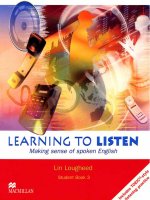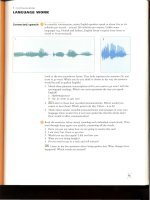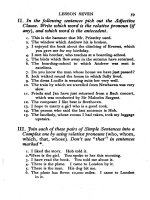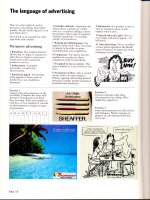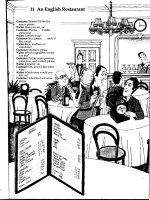Messages 3 students book
Bạn đang xem bản rút gọn của tài liệu. Xem và tải ngay bản đầy đủ của tài liệu tại đây (25.92 MB, 145 trang )
Cambridge University Press
0521614333 - Messages: Student’s Book 3
Diana Goodey, Noel Goodey and Miles Craven
Frontmatter
More information
© Cambridge University Press
www.cambridge.org
Vocabulary and
Pronunciation
Module 2 Descriptions
Module 1 Present and past
Grammar and
Expressions
Unit 1
Connections
●
●
Expressions : greetings
and introductions
●
Past simple
Past continuous
and past simple
●
Countries and
nationalities
Language
Using numbers
●
Communicative tasks
Listen to a song
Read a magazine article about
the English language
Understand the main idea
of an article
●
Unit 2
Past events
●
●
●
Grammar check
Unit 3
People
●
●
●
Unit 4
Places
●
●
Expressions : asking for
a description
Suggestions
Expressions of quantity:
too much/many, (not)
enough, a lot of
●
Unit 5
Goals
●
●
●
●
Present continuous
used for the future
The future with
going to
The future with will
and going to
Expressions : shopping
●
First conditional
The future with will
and might
will/won't + probably
●
Verbs describing
actions
Adventure
Link words
●
Life and culture : What a mixture!
●
Listen to a story about a
lucky discovery
Listen and complete a form
Read a short adventure story
Guess meaning from context
●
●
Pronunciation:
intonation in
questions
●
Ask questions when you meet
new people
Talk about yourself and your
friends
Describe someone you know
Write a report about your class
Adjectives describing
personality
The Internet
Opposites:
un- + adjective
●
●
●
Expressions : polite
requests
Listen to a personality test
Read a Web page
Use pronouns and possessive
adjectives
Life and culture : The British
●
●
Places
School
Uses of get
●
Pronunciation:
●
Listen to someone talking
about a place
Read an article about
a Japanese student's day
Scan a text for information
●
Life and culture : Australia
●
●
●
/k/ /p/ /t/
●
●
●
Progress check
●
●
Grammar check
Map of the book
●
●
●
●
●
●
●
●
Pronunciation:
●
Life and culture : The history of
the Olympics
●
Listen to a song
Read an article about artificial
intelligence
Identify the topic
●
Life and culture : Journey into
space
●
●
●
At the table
Artificial
intelligence
Compound nouns:
coffee maker
●
●
Pronunciation:
Write and act a conversation
about events in the past
Interview a friend about
a discovery
Write a short story
Listen to a talk about a cycling
trip
Read an interview with a young
athlete
Skim a text for the general idea
Study skills : Making a vocabulary notebook
Write a description using
comparatives and superlatives
Describe people's personality
Write a Web page about
yourself
Plan a day out with friends
Describe a place you know,
and things you like and don't
like there
Write about a typical day
Coursework: Getting around
/e/ /ei/ / /
Review
●
●
●
●
●
Sports clothes
Competitive sport
Adjective/verb +
preposition: good
at/worry about
/ai/ /υ/ / /
●
●
Coursework: Home life
●
Pronunciation:
stress in words
●
Life and culture : Journeys
and explorers
Progress check
Study skills : Thinking about learning
●
●
●
Pronunciation: weak
forms /ə/
●
●
Unit 6
Choices
●
●
●
Expressions : responding
to suggestions
Grammar check
●
●
Study skills : Your coursebook
Comparatives and
superlatives
(not) as ... as
Review
●
●
●
Expressions : giving
and accepting an
apology
Review
●
2
●
R E V I S I ON
●
●
Module 3 The future
Questions and
answers
Present continuous
and present simple
Listening and
Reading skills
Progress check
●
●
●
●
●
●
Talk about future plans
Talk about the future and
make offers
Make a conversation in a shop
Interview a friend and then
write about him/her
Make a conversation in
a restaurant
Describe things that aren't
certain and things that are
probable in the future
Write about future plans
Make predictions about life
in the future
Coursework: Shopping in London
Vocabulary and
Pronunciation
Module 4 Your world
Grammar and
Expressions
Unit 7
Achievements
●
●
●
Unit 8
Experiences
●
Expressions : I think
so. / I don't think so.
●
Present perfect
+ ever and never
+ just
+ for and since
●
Module 5 The way it’s done
Review
Unit 9
Getting it
right
Expressions : time
expressions with for
and since
Grammar check
●
●
●
Unit 10
Where is it
made?
Present perfect
Present perfect and
past simple
The infinitive of
purpose
●
●
●
●
Using a machine
The environment
●
Pronunciation:
●
●
●
●
/i/ /ɒ/ /əυ/
●
●
●
Outdoor activities
Music
Prepositions of time
Pronunciation:
Stress in words
Expressions :
thanking people
and responding to
thanks
Present simple
passive
Past simple passive
Expressions :
expressing a reaction
●
Illnesses and
injuries
Customs
Adverbs
●
Pronunciation:
●
●
●
●
●
●
Module 6 The way we live
Grammar check
Unit 11
Talking
●
●
●
●
Unit 12
New
beginnings
●
●
Expressions : asking
for clarification
used to
Second conditional
●
●
●
●
Expressions : saying
goodbye
●
Grammar check
Grammar index
●
Listen to a student describing
important people in his life
Read a biography of a rock band
Guess meaning from context
●
Life and culture : A poem: What
has happened to Lulu?
Progress check
/s/ /ʃ/
●
Life and culture : Mardi Gras
Materials
Animated films
Parts of speech
●
Listen and identify mistakes
Listen to a song
Read about animated films
Use pronouns and possessive
adjectives
●
●
Pronunciation:
weak forms /wəz/
●
●
●
●
●
Words from American
English
Synonyms
●
●
Life and culture: Central Park
●
●
Listen to a song
Read some extracts from
an encyclopaedia
Scan a text for information
●
Life and culture : Living in the past
●
●
●
●
●
●
●
●
●
●
●
Pronunciation:
Study skills : Checking your work
●
Describe rules at your school
and your ideal school
Talk about problems and give
advice
Write about customs in your
country
Describe where things are
made or produced
Write a general knowledge quiz
to do with the class
Describe a film you know well
Coursework: Mini phrase book
Listen to an argument
Read a story from the Internet
about a telephone conversation
Skim a text for the general idea
●
●
Describe your experiences
Talk about present situations
and how long they have
continued
Write a description of a person
you know
Write a biography
Life and culture : Living in an
international world
Progress check
Relationships
On the phone
Verbs that describe
speaking
Punctuation marks
Communicative functions index
●
Talk about things you've done
this week
Write and act an advert
Make a conversation about
using a machine
Write a letter about a campaign
Coursework: Useful information
●
●
/θ/ /ð/
Review
●
●
●
Pronunciation:
intonation in question
tags
●
●
●
●
●
●
●
Listen to two friends following
instructions
Do a quiz about customs around
the world
Identify the topic
Study skills : Speaking
Reported speech
Say and tell
Question tags
Listen to a radio advert
Read a newsletter about
a campaign
Understand the main idea of
a text
Life and culture : Saving Gwrych
Castle
●
/wə/
Review
Communicative tasks
●
●
●
Study skills : Learning to listen
have to, don't have
to, mustn't
should, shouldn't
Listening and
Reading skills
Progress check
Wordlist
●
●
●
●
Interview people about teenage
life and report what they said
Check information about
a friend
Write a conversation using
the correct punctuation
Describe your past and changes
in your life
Talk about imaginary situations
Write an essay about your
country
Coursework: Entertainment
Phonetic symbols
●
Verb forms and irregular verbs
Map of the book
●
Songs
3
Cambridge University Press
0521614333 - Messages: Student’s Book 3
Diana Goodey, Noel Goodey and Miles Craven
Excerpt
More information
IAN
AV
N
I
D
A
D Y
AN TUR
SCth CEN
8
XON
LO-SEANTURY AD
C
ANG
h
t
&6
5th
FRENCH
AD
RY
TU
EN
tC
1s
In Module 1 Steps 1 and 2 you study
11th CENTURY AD
TIN
LA
Present and past
Life and culture
Grammar
●
●
●
●
Questions and answers
Present continuous and
present simple
Past simple
Past continuous and past
simple
Vocabulary
●
●
Countries and nationalities
Verbs describing actions
Expressions
●
●
Greetings and
introductions
Giving and accepting
an apology
so that you can
●
●
●
●
●
●
●
Ask questions when you
meet new people
Greet and introduce
people in different ways
Describe nationality
and say where people
come from
Talk about yourself and
your friends
Talk about events in
the past
Say that you’re sorry
Describe events in the
past that are interrupted
by other events
What a mixture!
Journeys and explorers
Coursework 1
Part 1 Home life
You write about home life in
your country.
In Step 3 you ...
read
●
●
A magazine article about
the English language
A short adventure story
so that you can
●
●
Write a report about
your class
Write a short story
study
●
●
●
●
Numbers
Link words
Understanding the main
idea
Guessing meaning from
context
4
© Cambridge University Press
www.cambridge.org
Cambridge University Press
0521614333 - Messages: Student’s Book 3
Diana Goodey, Noel Goodey and Miles Craven
Excerpt
More information
What’s it about?
Coursework
My guidebook
What can you say about the pictures?
Now match the pictures with sentences 1–4.
1 The Grants always have coffee and toast for breakfast.
2 He made a spear to catch the fish in the lake.
3 Why is Ana crying?
4 Amelia Earhart was flying to Australia when her plane crashed.
a
In Book 3 you study
● a guidebook for visitors to
an English-speaking country
so that you can
● make a guidebook for an Englishspeaking visitor to your country
Your Coursework has got six parts:
Part 1 Home life
You write about home life in your
country.
Part 2 Getting around
b
You write about interesting places
in your country.
Part 3 Shopping in London
You write about shopping in your
town or in your capital city.
Part 4 Useful information
You write some useful information
for a visitor to your country.
Part 5 Mini phrase book
c
You write a mini phrase book for
a visitor to your country.
Part 6 Entertainment
You write about entertainment
in your country.
d
5
© Cambridge University Press
www.cambridge.org
Cambridge University Press
0521614333 - Messages: Student’s Book 3
Diana Goodey, Noel Goodey and Miles Craven
Excerpt
More information
STEP 1
1
In Step 1 you study
● questions and answers
● greetings and introductions
so that you can
● ask questions when you
meet new people
● greet people
● introduce people
1
Share your ideas
What can you say about the
photo? Where are the boy
and girl? What do you think
they’re saying?
They’re in a park.
2
Reading and
speaking
Where do you come from?
Revision
a Which questions do you
think the boy is asking?
Choose eight questions
from the list.
1 What’s your name?
2 Why are you laughing?
3 Where do you come
from?
4 Have you got any friends
here?
5 Do you live in Mexico
City?
6 Are you all right?
7 What do you think of
London?
8 What are you doing in
England?
9 Do you play tennis?
10 What’s the matter?
b Complete the conversation with questions from 2a.
JAY:
ANA:
JAY:
ANA:
JAY:
ANA:
JAY:
ANA:
JAY:
ANA:
JAY:
ANA:
JAY:
ANA:
JAY:
ANA:
JAY:
a
Are you all right?
No, I’m not.
b
I’m homesick.
c
I come from Mexico.
d
No, I don’t. I live in Veracruz.
e
I’m studying English. I’m staying with a family here.
f
I like it, but I sometimes feel a bit homesick.
g
No, I haven’t.
h
Ana.
Pleased to meet you, Ana. I’m Jay, Jay Sayer. Er ... do you fancy an
ice cream?
Listen and check.
c If you have time, practise the conversation between Jay and Ana.
6
Module 1
© Cambridge University Press
www.cambridge.org
Cambridge University Press
0521614333 - Messages: Student’s Book 3
Diana Goodey, Noel Goodey and Miles Craven
Excerpt
More information
3
Grammar revision Questions and answers
b Match the expressions with the
explanations. How do you say
these expressions in your
language?
1 Hi!/Hello! How are you?
2 Nice to meet you. / Pleased to
meet you.
3 How do you do?
Complete the questions with is/are, do/does, has/have.
Is Ana Mexican? – Yes, she is.
she happy? – No, she isn’t.
Jay and Ana in the park? – Yes, they are.
they both speak English? – Yes, they do.
Does Ana come from London? – No, she doesn’t.
she like London? – Yes, she does.
she got any English friends? – No, she hasn’t.
Ana and Jay got an ice cream? – No, they haven’t.
Where
Why
a This is a formal greeting. You
can use it when you meet an
adult for the first time.
b You often say this when you see
a friend.
c You say this when you meet
someone for the first time. It’s
friendly but it can be formal or
informal.
Ana live? – In Veracruz.
she crying? – Because she’s homesick.
1a, 2a
4
Practice
a Put the words in the right order and make questions.
Remember!
1 Are Jay and Ana old friends?
1
2
3
4
5
6
7
8
How do you do? isn’t really a question,
and the response is How do you do?
old / Ana / are / friends / Jay / and ?
they / where / are ?
Mexican / Jay / is ?
English / got / friends / Ana / any / has ?
she / homesick / is ?
from / she / where / come / does ?
studying / what’s / Ana ?
Veracruz / live / Jay / does / in ?
6
5
1
No, they aren’t.
7
Key expressions Greetings and introductions
a Read and complete the dialogues.
This
Mrs Jones, the
head teacher.
2
Hi, Jenny.
How
you today?
3
This is my
friend Tom.
I
fine,
thanks.
Listen and repeat the sentences.
Nice to
you, Tom.
How are /ə/ you today?
Where are /ə/ you from?
How do you /djə/ do?
Where do you /djə/ live?
Writing and speaking
Meeting people
Use what you know
Imagine you’re meeting an
English teenager for the first
time. Work with a friend and
make a short conversation.
A: Hi! I’m David. What’s your
name?
B: My name’s Max. Nice to meet
you, David.
A: Where do you come from,
Max?
Practise your conversation.
Listen and check.
Unit 1
© Cambridge University Press
Revision
How do you
do, Mrs Jones?
How do you do?
Weak forms /ə/
1
2
3
4
b Now ask and answer the questions in 4a.
Are Jay and Ana old friends?
Key pronunciation
7
www.cambridge.org
STEP 2
Cambridge University Press
0521614333 - Messages: Student’s Book 3
Diana Goodey, Noel Goodey and Miles Craven
Excerpt
More information
In Step 2 you study
● countries and nationalities
● present continuous and
present simple
1
so that you can
● say where people come from and their
nationality
● talk about yourself and your friends
Key vocabulary Countries and nationalities
a Match the countries with the nationalities.
Country Poland
Nationality Polish
Polish Australian Italy French Argentina British Greek American
Britain Canadian Mexico Spain Japanese the USA France Argentinian
Poland Australia Spanish Greece Mexican Japan Canada Italian
Listen and check.
b S Can you add any more countries and nationalities to your list?
You’ve got two minutes!
c What about you? Say your country/town and nationality, or talk
about your favourite star.
My favourite star is Johnny Depp. I think he’s American.
Remember!
We use a capital letter for the names of countries, nationalities and languages.
I live in Japan. I’m Japanese. I speak Japanese and English.
3
Key grammar
Present continuous and
present simple
a Look at the examples and
2
Presentation What are they doing?
a Think of at least two questions about the photo, then ask a friend your
questions.
b
Close your book and listen to the text about Ana. What’s she
thinking about?
When she’s at home in Veracruz, Ana usually starts the day with some
chilaquiles and a hot chocolate. She always has breakfast with her sister
Clara, and they talk about their plans for the day.
Now, of course, everything’s different. At the moment she’s sitting in the
kitchen with her English family, the Grants. She’s having a cup of coffee and
a piece of toast. The Grants always have coffee and toast for breakfast. It’s
raining outside and the Grants are talking about the weather again. But Ana
isn’t listening. She’s looking at the rain and she’s thinking about her sister,
at home in Veracruz.
c
1
2
3
4
5
6
8
Listen again and follow in your book. Ask and answer the questions.
What does Ana usually have for breakfast?
What’s she having today?
Is she talking to her sister?
Does her sister live in Veracruz?
What are the Grants doing?
What’s Ana doing?
complete the explanations.
At the moment, Ana’s
sitting in the kitchen.
We use the present
to talk about
actions in progress at the
moment.
The Grants always have
coffee and toast.
We use the present
to talk about
habits, or things that are
generally true.
1, 2
b Look at the text again
and find at least two
more examples of the
present continuous and
the present simple.
Module 1
© Cambridge University Press
www.cambridge.org
Cambridge University Press
0521614333 - Messages: Student’s Book 3
Diana Goodey, Noel Goodey and Miles Craven
Excerpt
More information
5
4
Listening and speaking Song
a
Listen to the song. How many
times do you hear the word jeans ?
b
Listen again. How many of
these things are mentioned?
1
2
3
4
5
6
7
8
9
6
Speaking Who is it?
Practice
a Complete the sentences with the present continuous
or the present simple.
1 The Grants often talk (talk) about the weather.
2 Ana
(not talk) to her sister at the moment.
3 Ana
(not like) tea.
4 At home in Mexico, she usually
(have) hot
chocolate for breakfast.
5 The Grants
(live) in London.
6 The weather isn’t good today. It
(rain).
7 It’s 7.30 am in London and Ana
(get up). But in
Veracruz it’s 1.30 am and Clara
(go) home after
a party.
8 Clara
(send ) her sister a text message nearly
every day.
b S What about you? How many true sentences can
you write about yourself, using the present continuous
and the present simple? You’ve got two minutes!
At the moment, I’m writing a sentence in English.
I like music and swimming.
Use what you know
Describe someone in the class.
Use the present continuous and
the present simple.
He’s wearing a black sweater.
He plays a lot of volleyball.
Can your friend guess who it is?
Try this!
How many days of the week can
you write using these letters? You can
use each letter more than once.
W T U N A H E O Y D M C N R F S
Is it Hugo?
No, it isn’t.
Unit 1
© Cambridge University Press
9
www.cambridge.org
STEP 3
Cambridge University Press
0521614333 - Messages: Student’s Book 3
Diana Goodey, Noel Goodey and Miles Craven
Excerpt
More information
In Step 3 you
● read a magazine article about the English language
● practise using numbers
Share your ideas Learning English
1
Why is English a useful language? Think of at
least three reasons.
so that you can
● write a report about your class
2
Reading
a Read the text. How many of your reasons can
you find?
It’s an international language.
ENGLISH WORLDWIDE!
This month we look at how the English language brings people together.
Mohammed is Egyptian.
He’s learning English at
school. About 750 million
people learn English as a
foreign language. They use it
in their job, when they travel
abroad, or when they want to
understand English films or songs.
id you know that a quarter of
all the people on Earth speak
English? That’s 1.5 billion people!
D
This is Tara. She’s from
New Zealand and English
is her first language.
About 450 million people
speak English as a first
language in countries like
Britain, the USA, Australia
and New Zealand.
English is the main language in international
business, in science and technology, in
sport and pop music. For example, nearly
70% of the world’s scientists read scientific
texts in English. On the Internet, over 60%
of home pages and about 85% of emails
are in English.
Language is a key to the outside world.
It helps you to connect with other people.
At the moment, about a billion people are
learning English, so you aren’t alone!
Portuguese 2%
Italian 4%
Chinese 4%
Korean 2%
French 4%
Spanish 5%
German 5%
Japanese 8%
English
57%
Other 9%
The languages of Internet users
Sandro is from Puerto Rico but now he lives
in New York. His first language is Spanish,
but he speaks English too. Thirty-six million
people in the USA come from Latin America.
They learn English as a second language
because they live in an English-speaking
country. About 375 million people across
the world use English as
a second language. In India,
for example, there are over
350 different languages,
so people often use
English to communicate
with each other.
10
Module 1
© Cambridge University Press
www.cambridge.org
Cambridge University Press
0521614333 - Messages: Student’s Book 3
Diana Goodey, Noel Goodey and Miles Craven
Excerpt
More information
3
b Comprehension check
Listen, and read the text again. Then
match 1–7 with a–g and make sentences.
1 English is the first language of
2 There are three hundred and seventy-five
million
3 There are three hundred and fifty
4 For thirty-six million Americans
5 Three quarters of a billion people
6 Seventy per cent of the world’s scientists
7 About eighty-five per cent of emails
a
b
c
d
e
f
g
different languages in India.
learn English as a foreign language.
four hundred and fifty million people.
are in English.
Spanish is their first language.
speakers of English as a second language.
can read texts in English.
Word work Numbers
a Match the words on the left with the figures
on the right.
1 a thousand
2 six thousand
3 a million
4 one and a half
5 two point seven five
6 seventy-five per cent
7 one and three quarters
8 four and a quarter
a
b
c
d
e
f
g
h
2.75
1,000
41/4
75%
6,000
13/4
1,000,000
11/2
b Write the underlined words in figures.
1 8,000
1
2
3
4
5
6
7
8
c Reading skills Understanding the main idea
1 What is the topic of the text?
a culture
b language
c countries
2 What do you think is the main idea of the
text? Read the beginning and the end again,
then choose the best answer.
Eight thousand people.
Three quarters of the class.
Five and a half years.
Nine point two litres of water.
A quarter of the population.
Sixty per cent of television programmes.
A million dollars.
Eighteen per cent of the world’s scientists.
c Test a friend Write a number in words.
Can your friend write it in figures?
A: Three million, two hundred and sixtyeight thousand, nine hundred and one.
B: 3,268,901
It’s about ...
a all the different languages in the world.
b English as an international language.
c English people all over the world.
Remember!
We use a hyphen in: seventy-five ninety-two
Writing guide Writing a report
●
Think of a title and write the date.
Statistics about our class 5th October
●
Introduce your report.
We asked questions about using
English. These are our results.
●
Start each new fact on a new line.
Two people in the class have got
an English-speaking friend.
Three quarters of the class watch
films in English.
4
Speaking and writing About my class
Use what you know
Ask your friends about using English, for example:
Do you think English is useful?
When do you use English?
Have you got any English-speaking friends?
Do you watch films in English?
With your teacher, choose three or four
questions to ask the whole class. Put the
answers on the board, then write a report.
Follow the Writing guide.
Unit 1
© Cambridge University Press
11
www.cambridge.org

